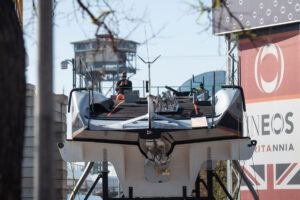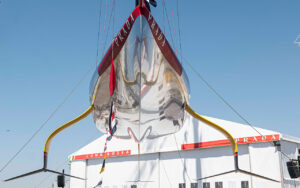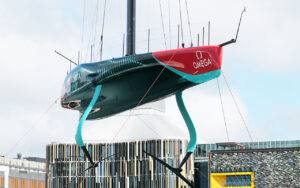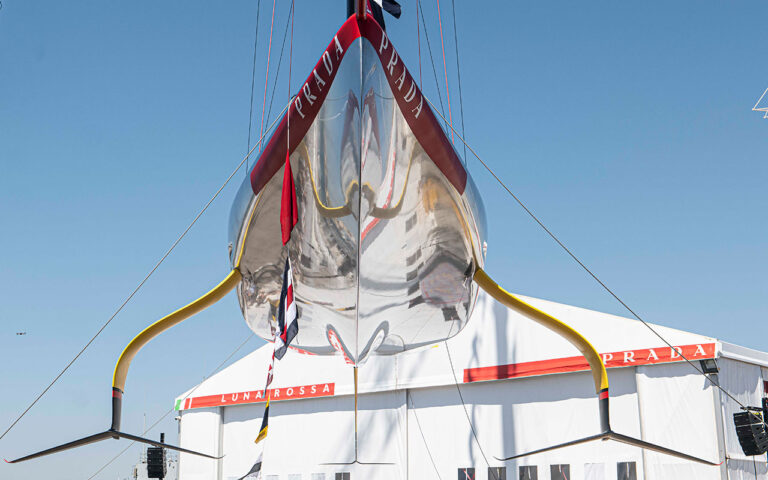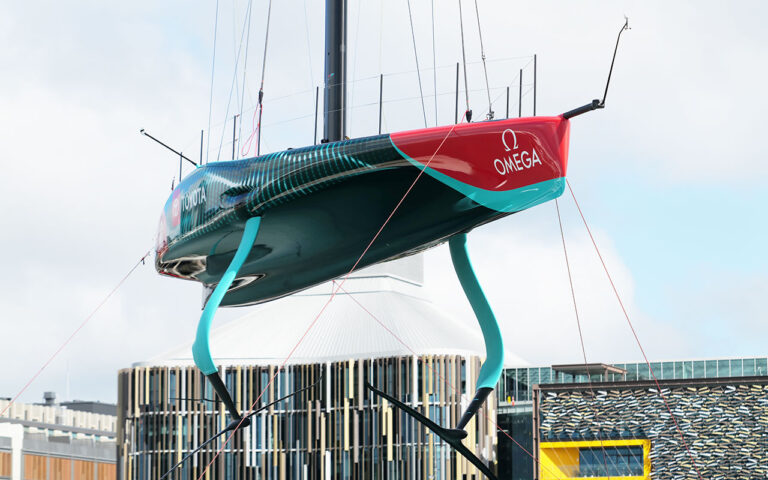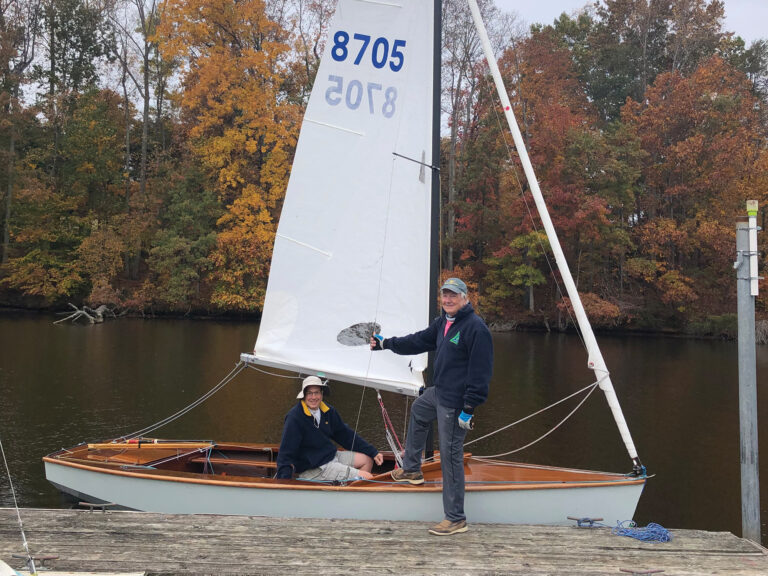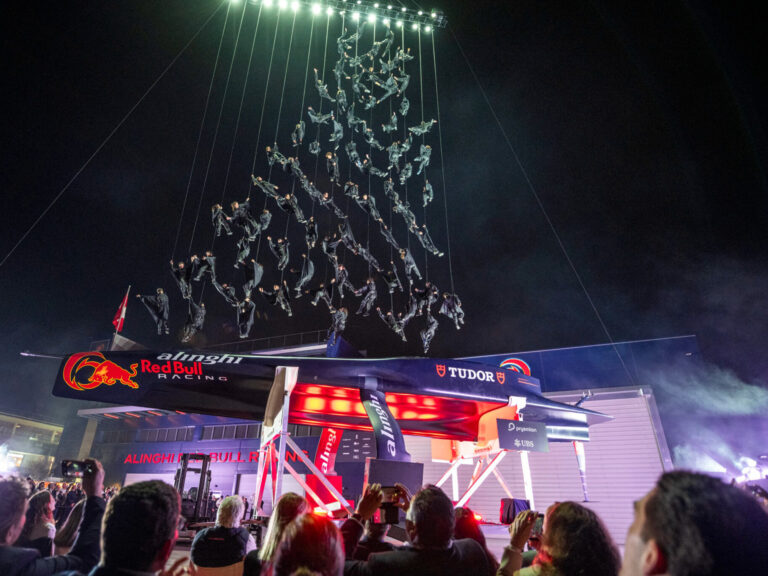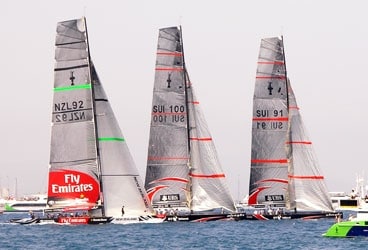
AC07_0630_Main
VALENCIA, Spain-In Friday’s Race 5 it was the crewwork of Emirates Team New Zealand that came under fire for costing the team the race. Today it was a tactical miscue that allowed Alinghi to score its second come-from-behind win in as many races and move to within one victory of successfully defending the 32nd America’s Cup.Though Race 6 was sailed in significantly different conditions from Race 5-a light seabreeze with minimal wave action as opposed to the 14- to 18-knot winds and moderate seas on Friday-the boats once again appeared as even as if they came out of the same mold, and we tuned in a similar manner. It was the sailors on board that made the difference. Many armchair tacticians were questioning Ainghi skipper Brad Butterworth’s skills earlier in this regatta, when he failed to cover Emirates Team New Zealand on the run of Race 3 and lost a solid lead, but there were no such questions today. In conditions that can drive a tactician to his wits end, Butterworth coolly found the one opportunity provided him by ETNZ and made the most of it. Once he had the lead, he did what he does as well as anyone in the game: protect it.This race officially turned about a third of the way up the second beat. NZL-92 had been in control of the race to that point, but Butterworth used the leeward gate to get some separation and then with both boats sailing on port tack toward the starboard layline, he picked the perfect moment, when he had slightly more pressure and could force Team New Zealand to sail into slightly less, to tack back and attack the slim Kiwi lead. Suddenly a 55-meter advantage shrunk to 25 and Terry Hutchinson, Emirates Team New Zealand tactician, elected to leebow the Swiss boat rather than attempt a risky cross. The next time the two boats came together two minutes later, Alinghi was able to live on the hip of NZL-92, the advantage line now resting in favor of the Swiss team by 30 meters. It was a stunning reversal. A subdued Dean Barker talked us through what happened from his perspective at the helm of NZL-92. Later he offered a more objective analysis of why they chose the left-side gate. However, there were two crucial moments on the run that enabled Alinghi to get close enough to Emirates Team New Zealand to be able to attack. Had the lead been any larger Butterworth might have waited and eventually been forced past the line. The first came toward the bottom of the first run. With 8 minutes remaining in the leg, Emirates Team New Zealand crossed Alinghi with a comfortable 120-meter lead. The Kiwi team jibed in a safe position to leeward and ahead and led its opposition toward the starboard-jibe layline. Over the next few minutes, with the boats sailing on port jibe and within spitting distance of each other, SUI-100 showed phenomenal boatspeed, eating up nearly half of that lead by the time the two boats jibed for the gate.At the leeward gate, Hutchinson made the decision that probably decided the race, electing to go straight into the left-side gate, allowing Alinghi to take the right-side gate, albeit with a Mexican (douse on the jibe) drop. Butterworth talked us through the gate and the first part of the beat during the press conference.Emirates Team New Zealand tacked soon after the rounding to keep close to Alinghi. As the two boats settled onto port, the lead was approximately 30 meters in favor of ETNZ. A slight left shift, maybe with a little extra pressure, helped NZL-92 lift away from SUI-100. But then Butterworth found the scenario he needed and used it for all it was worth. At times during the ensuing 14-minute run on port tack, ETNZ seemed to be crawling back into a position from which it might be able to force Alinghi off to the right side, and possible into doing two more tacks before the mark. But the moment never came and Team New Zealand and Alinghi tacked simultaneously on the port-tack layline. The delta around the windward mark was 16 seconds, but because the wind was so light and the boats were moving quite slowly, the lead was just 60 meters as the two boat settled in on port jibe. That quickly grew to nearly 100 and stayed that way for most of the run. Just when it looked like it was time to starting thinking about Race 7, ETNZ made a last-gasp comeback, closing to within a boatlength of the lead. But Butterworth, ever the cool hand on the back of the boat, simply positioned himself in a place where he knew the New Zealand team couldn’t get around him, in front and slightly to windward. Hutchinson called for one more jibe away, but it didn’t work. A bit of pressure and a late right shift pushed the lead back out to 100 meters. The final delta was 28 seconds. Another close race, another one that ETNZ had within its grasp.Like yesterday, Emirates Team New Zealand can take some comfort in the fact the two boats were dead even in yet another sailing condition. The two teams engaged in a 12-minute speed test on starboard tack off the starting line. Brad Butterworth said his team got what it wanted off the line and was close to making stick. Alinghi had the early advantage, but ETNZ patiently bidded its time, closing the gauge when it could, maintaining a bow-out advantage in relation to the wind, and waiting for the shift. It came with just a few minutes of sailing left but it proved to be enough to squeeze Alinghi off. Hutchinson and Barker benefited further from a series of left-hand puffs that never seemed to reach Alinghi, stretching away to a 60 to 80 meter lead as the two boats sailed toward the mark. Strategist Adam Beashel recounts the first beat from his position on NZL-92.What should we expect tomorrow? Well all three sailors that answered that question in the press conference said, expect the same thing from our team. Listen to Barker, Matt Mason, and Juan Vila explain how Sunday’s race needs to be treated as just another race, even if it could decide the fate of the America’s Cup.

